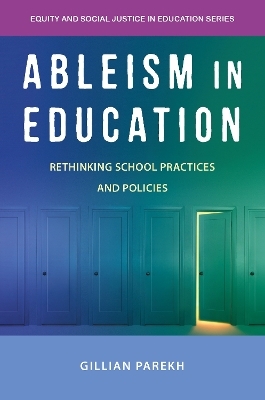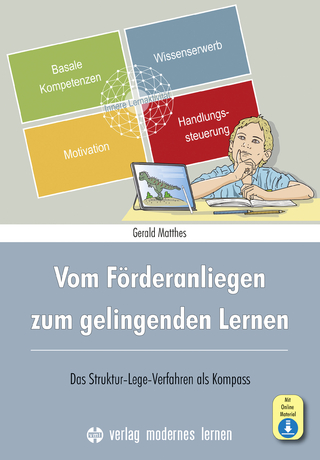
Ableism in Education
Routledge (Verlag)
978-1-032-59712-6 (ISBN)
How we organize children by ability in schools is often rooted in ableism.
Ability is so central to schooling—where we explicitly and continuously shape, assess, measure, and report on students’ abilities—that ability-based decisions often appear logical and natural. However, how schools respond to ability results in very real, lifelong social and economic consequences. Special education and academic streaming (or tracking) are two of the most prominent ability-based strategies public schools use to organize student learning. Both have had a long and complicated relationship with gender, race, and class.
In this down-to-earth guide, Dr. Gillian Parekh unpacks the realities of how ability and disability play out within schooling, including insights from students, teachers, and administrators about the barriers faced by students on the basis of ability. From the challenges with ability testing to gifted programs to the disability rights movement, Parekh shows how ableism is inextricably linked to other forms of bias. Her book is a powerful tool for educators committed to justice-seeking practices in schools.
Gillian Parekh is an educator, assistant professor and Canada Research Chair in Inclusion, Disability and Education within the Faculty of Education, York University. As a previous teacher in special education and research coordinator with the Toronto District School Board (TDSB), Gillian has conducted extensive system and school-based research in Toronto in the areas of structural equity, special education, and academic streaming. In particular, her work explores how schools construct and respond to disability as well as how students are organized across programs and systems. She resides in Ontario with her family.
Part I: Thinking Through Ability, Disability, and Ableism
1 Making Disability a Different Kind of Issue in Schools: Disability Studies in Education
2 How Ability is Constructed and Organized in Schools
3 Detangling the Relationship Between Race, Class, and Perceived Ability
Part II: How Students Are Organized by Ability
4 Special Education Program, Identification, and Placement
5 Academic Streaming and Hierarchies of Ability
6 Implicating Gifted and Talented Education
Part III: Practical Strategies for the School and Classroom
7 Critical Approaches to Inclusion
8 Inclusive Pedagogy and Practice
Conclusion: Moving Forward and Setting New Conditions for Justice
| Erscheinungsdatum | 05.09.2023 |
|---|---|
| Reihe/Serie | Equity and Social Justice in Education Series |
| Verlagsort | London |
| Sprache | englisch |
| Maße | 152 x 229 mm |
| Gewicht | 380 g |
| Themenwelt | Schulbuch / Wörterbuch |
| Sozialwissenschaften ► Pädagogik ► Sonder-, Heil- und Förderpädagogik | |
| Sozialwissenschaften ► Politik / Verwaltung | |
| Wirtschaft ► Betriebswirtschaft / Management ► Unternehmensführung / Management | |
| ISBN-10 | 1-032-59712-7 / 1032597127 |
| ISBN-13 | 978-1-032-59712-6 / 9781032597126 |
| Zustand | Neuware |
| Haben Sie eine Frage zum Produkt? |
aus dem Bereich


